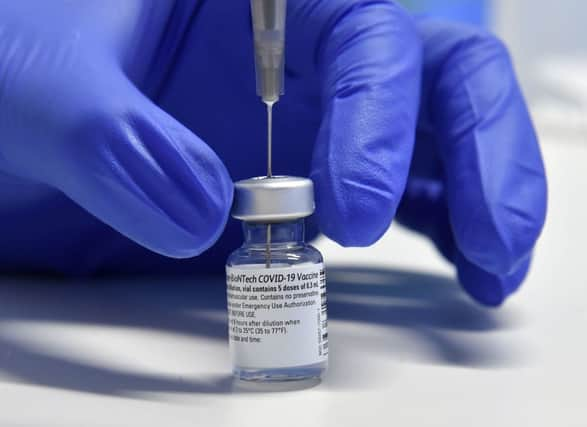UK expected to see ‘significant reduction’ in Covid vaccine supply in April - here’s why


The UK’s Covid vaccination supply is set to see a reduction next month due to a reported delay in the delivery of millions of Oxford-AstraZeneca vaccine doses from India.
The delivery had been expected from the Serum Institute of India, but has been held by up to four weeks, reported the BBC.
‘Significant reduction in weekly supply’
Advertisement
Hide AdAdvertisement
Hide AdAn NHS letter to health leaders in England, which was published on Wednesday (17 March), warned there would be a “significant reduction in weekly supply” of Covid vaccines.
The letter said: "The government's Vaccines Taskforce have now notified us that there will be a significant reduction in weekly supply available from manufacturers beginning in the week commencing March 29, meaning volumes for first doses will be significantly constrained."
The letter from Emily Lawson, NHS chief commercial officer, and Dr Nikita Kanani, medical director for primary care, also said that those “aged 49 years or younger should not be offered vaccination” unless they are in a higher priority group.
The letter also added that the UK’s vaccines taskforce predicts the shortfall will last for a period of four weeks “as a result of reductions in national inbound vaccines supply”.
Advertisement
Hide AdAdvertisement
Hide AdA spokesperson for the Serum Institute of India told the BBC: “Five million doses had been delivered a few weeks ago to the UK and we will try to supply more later, based on the current situation and the requirement for the government immunisation programme in India.”
A source told the BBC that although the original aim had been to deliver the next five million doses in March, there was not a specific stipulated time for the delivery of the jabs.
What does this delay mean?
Despite the expected reduction in vaccines in April, the Department of Health insists that it is still on track to offer a first dose to all adults by the end of July.
Cabinet minister Robert Jenrick told BBC Breakfast: “We are experiencing some supply issues so it does mean the vaccine rollout will be slightly slower than we may have hoped but not slower than the target we set ourselves.
Advertisement
Hide AdAdvertisement
Hide Ad“We’re going to move forward as quickly as we possibly can but it won’t be as fast as we might have hoped for a few weeks, but then we have every reason to believe that supply will increase in the months of May, June and July.”
Addressing the Government’s roadmap out of lockdown for England, Mr Jenrick said there is “no reason to believe” the easing of lockdown restrictions will be delayed by the vaccine supply shortage.
The Housing Secretary told Sky News: “There’s no reason to believe the road map is affected by this temporary shortage in supply.
“There’s no concern that we are off course on the road map.”